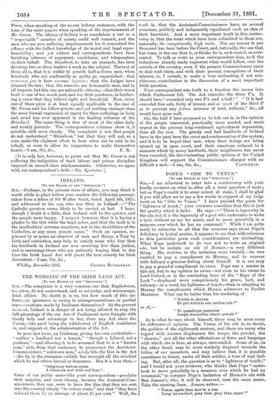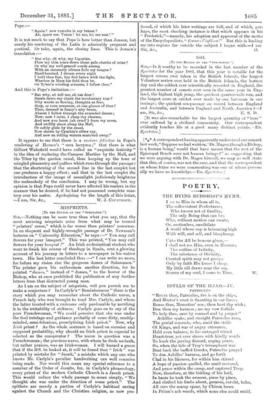POPE'S " ODE TO VENUS."
[TO THE EDITOR OF THE " SPECTATOR."] SIR,—I am reluctant to enter into a controversy with your kindly reviewer on what is, after all, a mere question of taste ; but as Pope's credit is to some extent at stake, I shall be glad if you will allow me to say a few words in support of my judg- ment on his " Ode to Venus." I have praised the poem for "lightness of touch," your reviewer considers that this is just the quality which it lacks. He says :—" There is ingenuity in the ode, but it is the ingenuity of a poet who undertakes to write a lyric without an ear for music, and to move gracefully in a
measure over which he has no command." While I am quite ready to subscribe to all that the reviewer says about Pope's deficiency in lyrical genius, it appears to me that with reference to this particular poem such considerations are misleading.
What Pope undertook to do was not to write an original ode, but to imitate an ode of Horace,—a very different thing. His motives in the imitation were twofold,—he was enabled to pay a compliment to Murray, and to express with delicacy a genuine feeling about himself. It is not easy to pay a graceful compliment in verse. Pope was a master in this art, but in my opinion he never—not even in his verses to Lord Oxford, or in the concluding lines of the " Rape of the Lock "—displayed more conspicuously his grace, tact, and delicacy—in a word, his lightness of touch—than in adapting to Murray the compliments which Horace addresses to Paulus Maximus. What can be better than his rendering of
" Nobilis et decens, Et pro solicitis non tacitus reis ?"
" Et quandoque potentior Largis muneribus riserit aemuli ?"
As to what he says about himself, there may be more roonz for difference of opinion. The Venus of his ode is, no doubt, the goddess of the eighteenth century, and there are many who regard with austere displeasure the hoops, the powder, the " charms," and all the other affectations of dress and language with which she is here, as always, surrounded. Some of us, on the other hand, may be more tenderly disposed towards the follies of our ancestors, and may believe that it is possible sometimes to detect, under all their artifice, a tone of real feel- ing. But, after all, the question is as to " lightness of touch ;" and I would ask your reviewer, who thinks that Pope " under- took to move gracefully in a measure over which he had no command," to compare Pope's imitation of Horace's ode with Ben Jonson's, who, it will be observed, uses the same metre..
Take the opening lines. Jonson writes :-
" Venus, again thou mov'st a war
Long intermitted, pray thee, pray thee, spare !"
or of,— Pope :—
"Again ? new tumults in my breast ?
Ah, spare me, Penns ! let me, let me rest !"
It is not much to say that Pope is here better than Jonson, but surely his rendering of the Latin is admirably pregnant and poetical. Or take, again, the closing lines. This is Jonson's translation :-
" But why, oh why, my Ligurine,
Flow my thin tears down these pale cheeks of mine ? Or why my well-graced words among With an uncomely silence fails my tongue ? Hard-hearted, I dream every night I hold thee fast, but fled hence with the light, Whether in Mars his field then be, Or Tyber's winding streams, I follow thee."
And this is Pope's imitation :— " But why, ah tell me, ah too dear !
Steals down my cheek the involuntary tear ?
Why words so flowing, thonghts so free, Stop, or turn nonsense, at one glance of thee ?
Thee, dressed in fancy's airy beam, Absent I follow through the extended dream; Now, now I seize, I clasp thy charms, And now you burst (ah cruel!) from my arms, And swiftly shoot along the Mall, Or softly glide by the canal, Now shown by Cynthia's silver ray, And now on rolling waters snatched away."
It appears to me that there is a curiosa felicitas in Pope's rendering of Horace's " rara lacryma ;" that there is what Gilbert Wakefield would have called an "exquisite festivity" in the idea of replacing the Campus Martins by the Mall, and the Tiber by the garden canal, thus keeping up the tone of mingled pleasantry and pathos which runs through the passage ; that the shortening of the second line in the last couplet but one produces a happy effect; and that in the last couplet the introduction of the image of moonlight judiciously heightens the melancholy of the conclusion. I may be wrong, but my opinion is that Pope could never have affected his readers in the manner that he desired, if he had not possessed complete mas- tery over his metre. Apologising for the length of this letter,







































 Previous page
Previous page